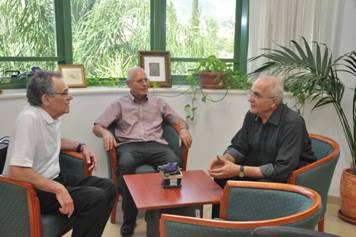News & Events
Professor Jacob Jorne gives lecture in Israel

Jacob Jorne went back home to Israel this summer -- to talk about lithium air batteries to students at Tel Aviv University and hydrogen fuel cells to students at Braude College in Karmiel.
The University of Rochester professor of Chemical Engineering is uniquely qualified to speak on both topics. His Ph.D. thesis entitled “The Electrochemical Behavior of the Alkali Metals in Propylene Carbonate” contributed to the development of lithium and lithium ion batteries. Lithium-ion batteries are used in all electric and hybrid vehicles.
Jorne’s lecture at Tel Aviv, entitled “Lithium Air Batteries: Wishful Thinking or Reality?” laid out the pros and cons of the hoped-for “ultimate” lithium battery, which potentially would have 5-15 times the energy density of current lithium-ion batteries. Though the biggest impact would be in vehicles, lithium air batteries could also be used in mobile devices. However significant technical challenges limit “Li-Airs,” for now, to the laboratory.
“It’s a big challenge, but we must pursue it,” Jorne said. “But we must do so in a fundamental way, because the problems are fundamental, not just technical.”
His lecture at Braude reflected Jorne’s recent research focus on another promising alternative source of energy for vehicles: PEM hydrogen fuel cells. Jorne and his students have looked specifically at how to reduce the amount of costly platinum employed for the oxygen exchange that occurs in PEM fuel cells. Jorne worked closely with the General Motors Fuel Cell Plant in Honeoye Falls, NY, until it was recently relocated to Michigan.
Though that has affected his research efforts, it has not lessened his interest in PEM fuel cells, Jorne said.
During the lectures, Jorne said, he emphasized the need to increase the travel range of electrical vehicles, which is now limited to 70 miles between recharging. “Li-air” batteries could increase that “significantly,” Jorne said, and PEM fuel cells can offer an acceptable range of up to 400 miles between hydrogen reloading.
Jorne praisedTel Aviv University as a “world class” educational and research institution, and said he was also pleased by what he saw at Braude, which emphasizes undergraduate teaching but also offers research opportunities. For example, he visited the fuel cell laboratory at Braude’s Department of Electrical and Electronic Engineering, watched a demonstration of robotic vehicles developed by students and faculty in the Mechanical Engineering Department, and talked with a biotech professor investigating the synthesis of artificial muscle tissue.
Jorne said he would urge students to take advantage of the Braude College Exchange, offered through the University of Rochester’s Study Abroad program. It allows mechanical engineering students to spend the spring of their sophomore year studying there. The courses in the program are taught in English. Jorne believes study abroad is important for the personal growth of students – for the “enrichment of life and experience.”
Jorne was born in Israel, grew up in Tel Aviv, and graduated with bachelor’s and master’s degrees from the Technion in Haifa, Israel, before earning his PhD at Berkeley in 1972.
He tries to get back to Israel every three or four years. “It was special to see how it has become a highly developed country,” Jorne said. “It’s changed from a country that was based on growing oranges – that was the main export – into a high-tech country.”
